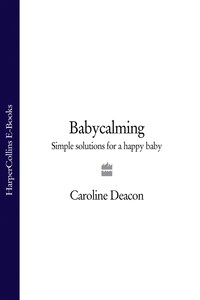Thorsons
An Imprint of HarperCollinsPublishers 1 London Bridge Street London SE1 9GF
www.harpercollins.co.uk
Thorsons is a trademark of HarperCollinsPublishers Ltd
First published in collaboration
with National Childbirth Trust Publishing 2004
© NCT Publishing 2004
Caroline Deacon asserts the moral right to be identified as the author of this work
Extracts from Dream Babies by Christina Hardyment (Jonathan Cape, 1983,) are published with kind permission of the author © 1983 by Christina Hardyment
A catalogue record for this book
is available from the British Library
All rights reserved under International and Pan-American Copyright Conventions. By payment of the required fees, you have been granted the nonexclusive, nontransferable right to access and read the text of this e-book onscreen. No part of this text may be reproduced, transmitted, downloaded, decompiled, reverse engineered, or stored in or introduced into any information storage and retrieval system, in any form or by any means, whether electronic or mechanical, now known or hereinafter invented, without the express written permission of HarperCollins e-books.
HarperCollinsPublishers has made every reasonable effort to ensure that any picture content and written content in this ebook has been included or removed in accordance with the contractual and technological constraints in operation at the time of publication.
Source ISBN: 9780007159024
Ebook Edition © JUNE 2016 ISBN: 9780007380022
Version: 2016-06-29
After all the anticipation during pregnancy, when your baby finally arrives, no matter how organized you are, life will feel pretty chaotic amidst the excitement and wonder. New parents in particular are thrown straight in at the deep-end – after all, your baby doesn’t come with a handy manual – and the sense of responsibility can be overwhelming.
Like most people, you are probably used to running your life with one eye on the clock and the other on the task in hand: you have a routine and normally expect to do certain things in a certain order throughout the day. Because of this, it is natural to hope that your baby will fall into a routine that will complement yours and enable you to plan and manage your day-to-day life.
At the same time, you also hope that your baby will be happy, feed easily and sleep well. If he cries, you would like what he needs to be obvious, so that you can know how to respond. However, many babies do not appear to behave like this: they cry seemingly without reason, they sleep in fits and starts or they want to feed all the time. They don’t seem to have an internal clock and they show no interest in the clock on the wall!
Your baby spent his first nine months being held, rocked and moved around in the womb. He was in constant contact with his mum and could hear her heartbeat, her voice, feel the warmth of her body and the sensation of being tightly held. He expected things to continue like this after birth: being in constant contact with another human being, feeling warm, snug and secure. If he thinks has been abandoned, he cries, a response that has evolved over millions of years to make sure a responsible adult picks him up and keeps him safe. If he is hungry, uncomfortable, tired or bored he will cry.
A psychologist called Maslow pointed out that in order for human beings to be fulfilled, reach their potential and enjoy life – ‘reach self-actualization’ is how he put it – they need to have their basic needs met. You can’t sit and concentrate on a book or film if you are hungry, thirsty or need the toilet. Great philosophy or art will pass you by if you are homeless and worried about your safety.








